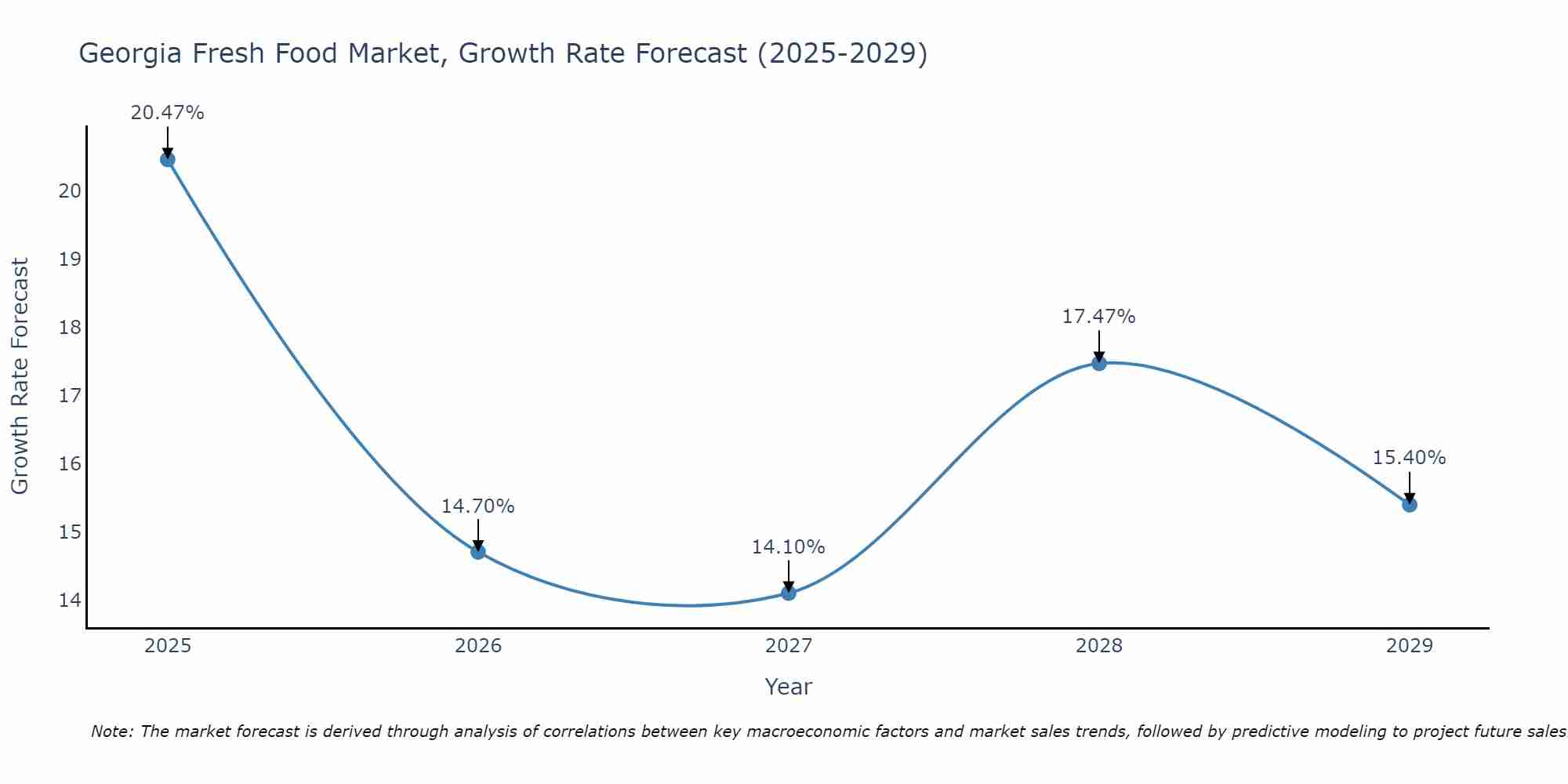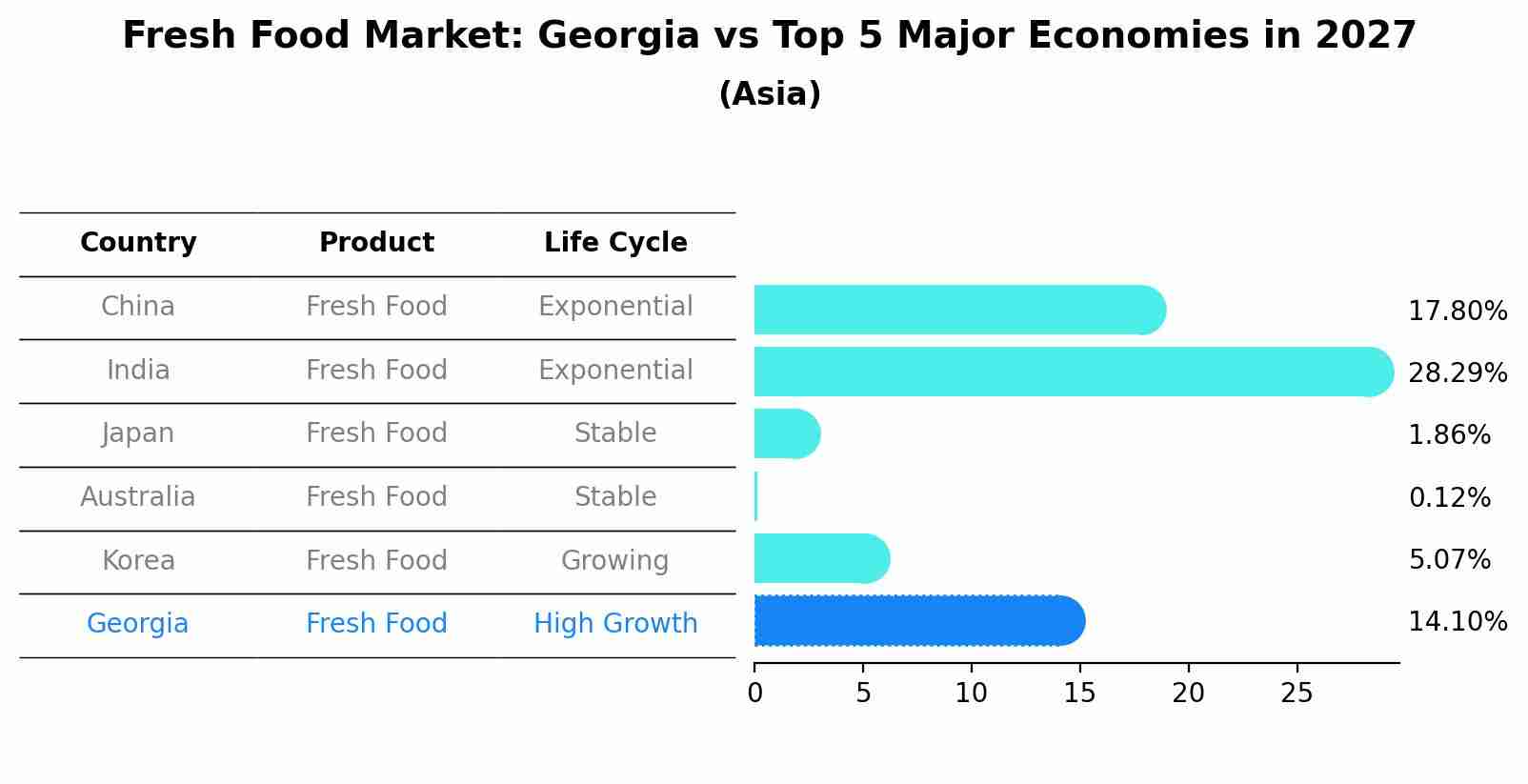Georgia Fresh Food Market (2025-2031) Outlook | Growth, Share, Forecast, Size, Analysis, Value, Revenue, Trends, Companies & Industry
| Product Code: ETC382140 | Publication Date: Aug 2022 | Updated Date: Jul 2025 | Product Type: Market Research Report | |
| Publisher: 6Wresearch | Author: Vasudha | No. of Pages: 75 | No. of Figures: 35 | No. of Tables: 20 |
Georgia Fresh Food Market Size Growth Rate
The Georgia Fresh Food Market is projected to witness mixed growth rate patterns during 2025 to 2029. Starting high at 20.47% in 2025, the market steadily declines to 15.40% by 2029.

Fresh Food Market: Georgia vs Top 5 Major Economies in 2027 (Asia)
The Fresh Food market in Georgia is projected to grow at a high growth rate of 14.10% by 2027, within the Asia region led by China, along with other countries like India, Japan, Australia and South Korea, collectively shaping a dynamic and evolving market environment driven by innovation and increasing adoption of emerging technologies.

Georgia Fresh Food Market Synopsis
The Georgia Fresh Food Market is a well-established grocery store chain in the state of Georgia, offering a wide variety of fresh produce, meats, dairy products, and packaged goods to its customers. Known for its commitment to providing high-quality, locally sourced ingredients, the market has built a strong reputation for freshness and affordability. With multiple locations across the state, the Georgia Fresh Food Market caters to a diverse customer base, including families, health-conscious individuals, and food enthusiasts. The store`s emphasis on promoting healthy eating habits and supporting local farmers has resonated well with consumers, contributing to its loyal customer base and sustained success in the competitive grocery industry.
Georgia Fresh Food Market Trends
The Georgia fresh food market is currently experiencing a surge in demand for locally sourced and organic products. Consumers are increasingly seeking out fresh fruits and vegetables, meat, and dairy products that are grown and produced within the state. This trend is driven by a growing awareness of the benefits of supporting local farmers, reducing carbon footprint, and consuming healthier, more sustainable food. In addition, there is a rising interest in specialty and artisanal products, such as craft cheeses, handmade jams, and small-batch baked goods, reflecting a desire for unique and high-quality food options. Retailers and farmers markets are responding to these trends by expanding their offerings of locally sourced produce and promoting the benefits of buying fresh, seasonal foods directly from local producers.
Georgia Fresh Food Market Challenges
The Georgia Fresh Food Market faces several challenges, including sourcing consistent supplies of fresh produce due to seasonal variations and weather conditions. Additionally, competition from larger grocery chains and online retailers poses a threat to the market`s customer base. Limited access to distribution channels and transportation infrastructure can also hinder the market`s ability to reach a broader audience. Furthermore, maintaining affordable pricing while ensuring quality and freshness of products presents a constant balancing act for the market. In order to thrive, the Georgia Fresh Food Market must address these challenges by implementing effective supply chain management strategies, enhancing marketing efforts to differentiate itself from competitors, and exploring partnerships with local farmers and producers to secure a reliable source of fresh food products.
Georgia Fresh Food Market Investment Opportunities
Investment opportunities in the Georgia Fresh Food Market include supporting local farmers by investing in agricultural technology and infrastructure to improve efficiency and increase production. Additionally, there is potential to invest in distribution networks and transportation systems to facilitate the movement of fresh produce from farms to markets. Another opportunity lies in investing in value-added food processing facilities to create packaged and processed food products using locally sourced ingredients. Furthermore, there is a growing demand for organic and sustainable food options in Georgia, presenting an opportunity to invest in organic farming practices and certification. Overall, investing in the Georgia Fresh Food Market offers avenues to support local farmers, enhance food supply chains, and capitalize on the increasing consumer preference for fresh, locally sourced food products.
Jordan Agar Market Government Policies
The Georgia Fresh Food Market is subject to several government policies aimed at promoting food safety, fair trade practices, and consumer protection. The market must comply with regulations set by the Georgia Department of Agriculture, which includes regular inspections of food handling and storage practices. Additionally, the market must adhere to federal guidelines such as the Food Safety Modernization Act and the USDA`s Agricultural Marketing Service standards. In terms of fair trade, the market may be subject to state and federal regulations governing pricing practices and labeling requirements. Consumer protection laws also come into play, ensuring that the market provides accurate information to customers regarding product origins, nutritional content, and potential allergens. Overall, these government policies aim to maintain the integrity of the Georgia Fresh Food Market and safeguard the well-being of consumers.
Georgia Fresh Food Market Future Outlook
The Georgia Fresh Food Market is poised for steady growth in the coming years due to increasing consumer demand for locally sourced, organic, and sustainable produce. With a growing focus on health and wellness, consumers are seeking fresh, high-quality food options, creating opportunities for the market to expand its offerings. Additionally, the trend towards supporting local farmers and businesses will further drive growth in the market as consumers prioritize buying from regional producers. To capitalize on this trend, the Georgia Fresh Food Market should continue to emphasize its commitment to providing fresh, locally sourced products while also exploring innovative ways to enhance the overall shopping experience through technology and convenience. By staying ahead of consumer preferences and market trends, the Georgia Fresh Food Market can establish itself as a leading destination for fresh, high-quality food products in the region.
Key Highlights of the Report:
- Georgia Fresh Food Market Outlook
- Market Size of Georgia Fresh Food Market, 2024
- Forecast of Georgia Fresh Food Market, 2031
- Historical Data and Forecast of Georgia Fresh Food Revenues & Volume for the Period 2021 - 2031
- Georgia Fresh Food Market Trend Evolution
- Georgia Fresh Food Market Drivers and Challenges
- Georgia Fresh Food Price Trends
- Georgia Fresh Food Porter's Five Forces
- Georgia Fresh Food Industry Life Cycle
- Historical Data and Forecast of Georgia Fresh Food Market Revenues & Volume By for the Period 2021 - 2031
- Historical Data and Forecast of Georgia Fresh Food Market Revenues & Volume By Fru t nd Vgtbl for the Period 2021 - 2031
- Historical Data and Forecast of Georgia Fresh Food Market Revenues & Volume By t nd ultr for the Period 2021 - 2031
- Historical Data and Forecast of Georgia Fresh Food Market Revenues & Volume By fd for the Period 2021 - 2031
- Historical Data and Forecast of Georgia Fresh Food Market Revenues & Volume By gg for the Period 2021 - 2031
- Historical Data and Forecast of Georgia Fresh Food Market Revenues & Volume By thr for the Period 2021 - 2031
- Historical Data and Forecast of Georgia Fresh Food Market Revenues & Volume By l t n for the Period 2021 - 2031
- Historical Data and Forecast of Georgia Fresh Food Market Revenues & Volume By u rmrkt for the Period 2021 - 2031
- Historical Data and Forecast of Georgia Fresh Food Market Revenues & Volume By rmrkt for the Period 2021 - 2031
- Historical Data and Forecast of Georgia Fresh Food Market Revenues & Volume By Wt nd n rkt for the Period 2021 - 2031
- Historical Data and Forecast of Georgia Fresh Food Market Revenues & Volume By nl n for the Period 2021 - 2031
- Historical Data and Forecast of Georgia Fresh Food Market Revenues & Volume By thr for the Period 2021 - 2031
- Georgia Fresh Food Import Export Trade Statistics
- Market Opportunity Assessment By
- Market Opportunity Assessment By l t n
- Georgia Fresh Food Top Companies Market Share
- Georgia Fresh Food Competitive Benchmarking By Technical and Operational Parameters
- Georgia Fresh Food Company Profiles
- Georgia Fresh Food Key Strategic Recommendations
Frequently Asked Questions About the Market Study (FAQs):
- Single User License$ 1,995
- Department License$ 2,400
- Site License$ 3,120
- Global License$ 3,795
Search
Thought Leadership and Analyst Meet
Our Clients
Related Reports
- Afghanistan Apparel Market (2026-2032) | Growth, Outlook, Industry, Segmentation, Forecast, Size, Companies, Trends, Value, Share, Analysis & Revenue
- Canada Oil and Gas Market (2026-2032) | Share, Segmentation, Value, Industry, Trends, Forecast, Analysis, Size & Revenue, Growth, Competitive Landscape, Outlook, Companies
- Germany Breakfast Food Market (2026-2032) | Industry, Share, Growth, Size, Companies, Value, Analysis, Revenue, Trends, Forecast & Outlook
- Australia Briquette Market (2025-2031) | Growth, Size, Revenue, Forecast, Analysis, Trends, Value, Share, Industry & Companies
- Vietnam System Integrator Market (2025-2031) | Size, Companies, Analysis, Industry, Value, Forecast, Growth, Trends, Revenue & Share
- ASEAN and Thailand Brain Health Supplements Market (2025-2031) | Strategy, Consumer Insights, Analysis, Investment Trends, Opportunities, Growth, Size, Share, Industry, Revenue, Segments, Value, Segmentation, Supply, Forecast, Restraints, Outlook, Competition, Drivers, Trends, Demand, Pricing Analysis, Competitive, Strategic Insights, Companies, Challenges
- ASEAN Bearings Market (2025-2031) | Strategy, Consumer Insights, Analysis, Investment Trends, Opportunities, Growth, Size, Share, Industry, Revenue, Segments, Value, Segmentation, Supply, Forecast, Restraints, Outlook, Competition, Drivers, Trends, Demand, Pricing Analysis, Competitive, Strategic Insights, Companies, Challenges
- Europe Flooring Market (2025-2031) | Outlook, Share, Industry, Trends, Forecast, Companies, Revenue, Size, Analysis, Growth & Value
- Saudi Arabia Manlift Market (2025-2031) | Outlook, Size, Growth, Trends, Companies, Industry, Revenue, Value, Share, Forecast & Analysis
- Uganda Excavator, Crane, and Wheel Loaders Market (2025-2031) | Strategy, Consumer Insights, Analysis, Investment Trends, Opportunities, Growth, Size, Share, Industry, Revenue, Segments, Value, Segmentation, Supply, Forecast, Restraints, Outlook, Competition, Drivers, Trends, Demand, Pricing Analysis, Competitive, Strategic Insights, Companies, Challenges
Industry Events and Analyst Meet
Whitepaper
- Middle East & Africa Commercial Security Market Click here to view more.
- Middle East & Africa Fire Safety Systems & Equipment Market Click here to view more.
- GCC Drone Market Click here to view more.
- Middle East Lighting Fixture Market Click here to view more.
- GCC Physical & Perimeter Security Market Click here to view more.
6WResearch In News
- Doha a strategic location for EV manufacturing hub: IPA Qatar
- Demand for luxury TVs surging in the GCC, says Samsung
- Empowering Growth: The Thriving Journey of Bangladesh’s Cable Industry
- Demand for luxury TVs surging in the GCC, says Samsung
- Video call with a traditional healer? Once unthinkable, it’s now common in South Africa
- Intelligent Buildings To Smooth GCC’s Path To Net Zero


















